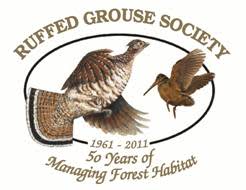Area Conservation Group to Host Fundraiser Dinner in Green Bay, Wisconsin
Ruffed Grouse Society 08.29.12

Proceeds used to restore and protect grouse and woodcock habitat
The Northeast Wisconsin Chapter of the Ruffed Grouse Society (RGS) will host its 31st Annual Sportsmen’s Banquet on Thursday, September 6, 2012at the Rock Garden Supper Club, 1951 Bond Street, Green Bay, WI, beginning with a reception party at 5:30 p.m.Dinner will be served at 7:30 p.m.
According to Jim Schuettpelz, individual membership and dinner tickets are $60. There is also an optional family membership package for $90 which includes two dinners. Additional family dinners are available at $30 each. Banquet, Conservation and Sustaining sponsorship packages are also available at $275, $500 and $1,000 respectively. (Tickets purchased by Aug. 31 will be eligible to win the early bird door prize).
And, in the spirit of the outdoors, youngsters under the age of 16 who recently took and passed a hunter education course and/or women who have participated in a recent Outdoors Women program, and can verify same; will receive a complimentary dinner ticket when accompanied by a paying adult.
As is the custom at this event, the evening will feature a live and silent auction, games, drawings and door prizes, highlighted with the finest selection of quality firearms, jewelry, artwork and collectables.
For more information and/or tickets contact Schuettpelz at 920-469-0751 or by e-mail at jkschuet@att.net .
As with allRGSfundraisers, proceeds from this event will be used to restore and protect grouse and woodcock habitat.

